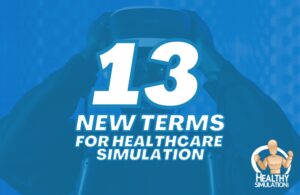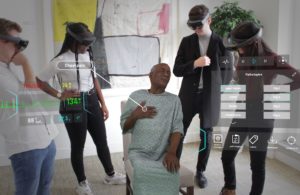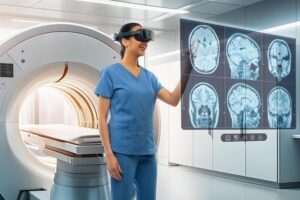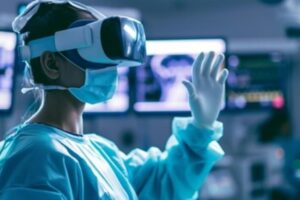Metaverse in Healthcare
What is considered to be a network of 3D virtual worlds designed to focus on social connection, the metaverse is a place parallel to the physical world that is being used to help facilitate healthcare simulation training. Through the use of virtual reality technology, learners are able to enter the metaverse to access education and training materials from anywhere, at any time. This technology is helping to revolutionize the way medical education is taught, and more academic institutions are beginning to incorporate this method of learning.
According to the Accenture Digital Health Technology Vision 2022 report, the metaverse offers an evolving set of possibilities for how each individual lives their life and how they experience healthcare. As technology provides a means to transport people to “nearly any type of world we can imagine,” learners are able to use the metaverse to interact with clinicians, peers, and enterprises at a distance.
Accenture believes that healthcare organizations will shift part of their operations to the metaverse, maintaining their own internal virtual environments so employees. This will better enable them to work from anywhere and collaborate in new ways based on data that can be authenticated.
Sponsored Content:
“Healthcare organizations will be able to transcend time and space to simulate interactions, shorten learning cycles, and practice procedures, such as in surgical training,” the report states. “The metaverse will enable more life-like virtual therapeutics and will empower patients to manage their health and perform self-care. It also offers opportunities to help healthcare employees build empathy around the human experience.”
Also of note in this report, Accenture found that ninety-seven percent of healthcare executives believe continuous advances in technology are becoming more reliable than economic, political, or social trends in informing their organization’s long-term strategy. To date, Accenture says the information technology company sees the metaverse as having two primary functions: Creating the “Internet of Place” and the “Internet of Ownership.”
As the metaverse continues to evolve, Accenture predicts that this technology will create new lines of business and transform interactions between people and organizations. Through these innovations, “healthcare organizations will be able to transcend time and space to simulate interactions, shorten learning cycles and practice procedures, such as in surgical training.”
In an interview with Healthcare Finance News, Senior Managing Director in Accenture Health, Kaveh Safavi, explained that capitalizing on the metaverse (or “the space in between the real and fully virtual worlds”) is healthcare’s biggest opportunity today. He believes the metaverse has the potential to truly augmented reality and the ability to layer digital information on top of clinicians’ real-world experience, as well as medical students’ training with more effective hands-on learning.
Sponsored Content:
However, he noted that IT/security breaches are a real concern. Safavi shared that to connect these technologies safely and at scale healthcare organizations need the right channel, source, policies, and governance in place to have trustworthy data. He said this could mean participating in ecosystem-wide efforts to set standards for how devices connect and communicate in healthcare.
Similarly, a Forbes article expressed that healthcare is another field where the impact of the metaverse could be transformational. The article further explains that the metaverse involves the convergence of three major technological trends: telepresence (allowing people to be together virtually, even while they are apart physically), digital twinning, and blockchain (and the ability to let users create a distributed internet). Together, author, Bernard Marr, says these trends could create “entirely new channels for delivering care that have the potential to lower costs and vastly improve patient outcomes.”
Examples of Metaverse in Healthcare Companies & Solutions
Axon Park: Axon Park is an e-learning company focused on building the virtual campus of the future. The company helps organizations, governments, and universities harness the power of virtual reality (VR in simulation), augmented reality (AR in simulation), and extended reality (XR in simulation) for training and education. Axon Park is an equal-opportunity employer dedicated to building an inclusive and immersive future while striving for XR as a means to equalize access to opportunity.
Axon Park received the award for “Best Presentation” at the Mount Sinai Tri-State Simulation Symposium in September and was selected by the IDSA as a finalist for their annual IDea Incubator. The company is committed to advancing the field of VR training through the expansion of the “Axon Park Virtual Campus” and subsequent virtual training materials.
Aimedis is a medical ecosystem combining professional healthcare knowledge with the swarm intelligence of patient communities. The Aimedis team has been working on multiple e-health projects since 2009 including a solution for the pharmaceutical industry. The team’s experiences combined with more than 12 years of clinical experience and experience in the pharmaceutical industry the founders are integral components of the ecosystem – an ecosystem, which benefits both the patients and professionals in the medical field.
Yashoda Hospitals: Yashoda Hospitals Hyderabad purchased a plot of land on decentral and, the most popular metaverse platform, and established an experience zone to commemorate the system’s 30+ years of healthcare service to the people. Yashoda Hospitals is India’’s first healthcare group to establish a presence on a metaverse platform.
Dr. Abhinav Gorukanti, Director of Yashoda Hospitals, said, “Since the beginning, we have aimed to be progressive as a group. We have many firsts to our accolade, including clinical excellence, infrastructure, and innovation. We have been early adopters of digital technology that adds value to our ecosystem, from Web 1.0 to Web 2.0 and now Web 3.0.”
“We believe the future will be driven by core technologies like the blockchain and Web 3.0, moving from a centralized to a decentralized ecosystem. Setting up our presence on decentral is the first step towards our efforts and acceptance of decentralized technology. We will continue to upgrade and invest in making our digital infrastructure future-ready,” he added. Learn more about the Metaverse in Healthcare by reading the articles below.

10 Additional Medical Simulation Keywords You Need to Know About

Latest Clinical Simulation News From Around the World | June 2022

GigXR Partners With Leading Medical Education Programs to Develop Healthcare Simulation Metaverse
Sponsored Content:















